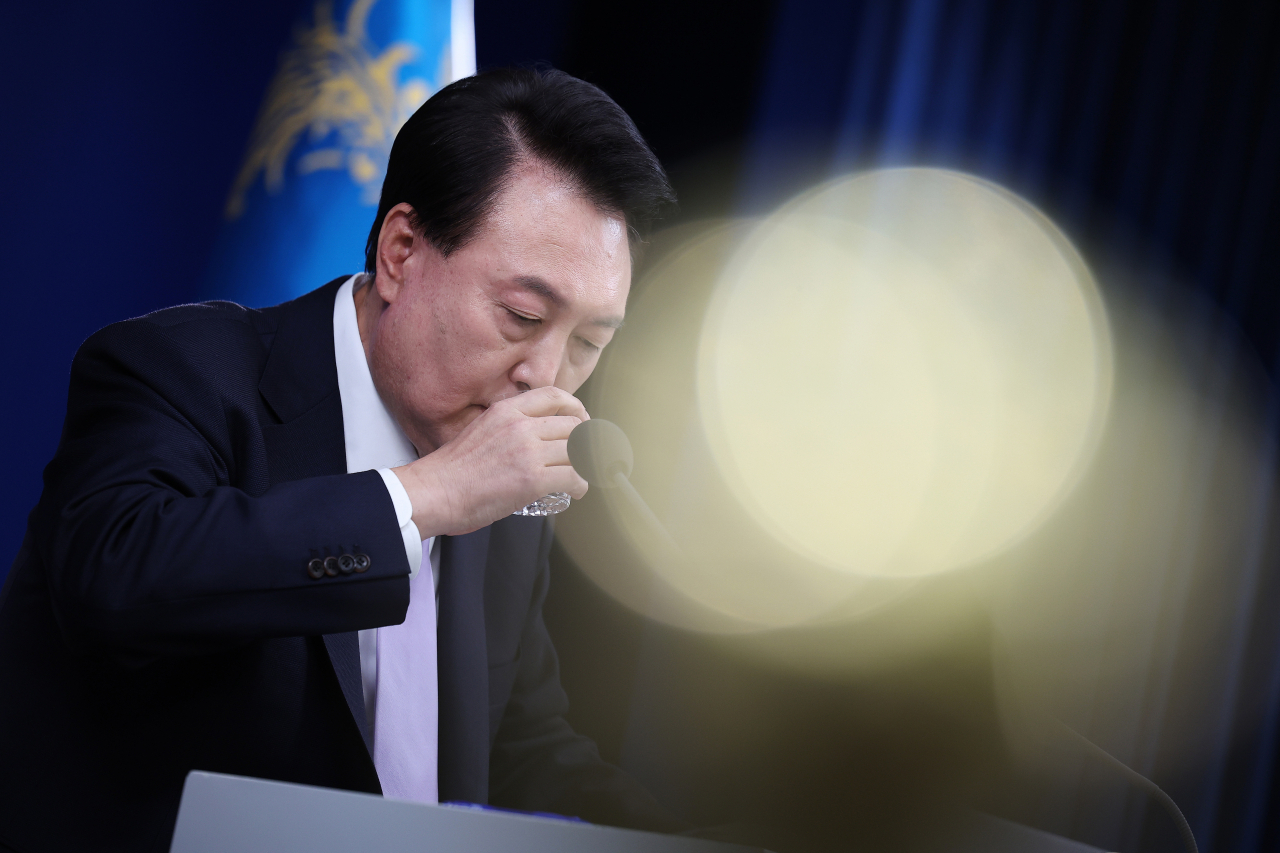
South Korea's 20th president, Yoon Suk Yeol, has become the third leader in the country's history to face impeachment proceedings in the National Assembly, following former Presidents Park Geun-hye and Roh Moo-hyun.
As Yoon's political future remains uncertain, the differing outcomes of Park and Roh's impeachment cases provide a context for potential developments.
The main opposition Democratic Party of Korea, along with allied parties, plans to vote on the impeachment motion against Yoon on Saturday. The motion was reported to the plenary session at 12:48 a.m. on Thursday and must be voted on within 24 to 72 hours.
The impeachment motion accuses Yoon of treasonous acts, alleging that his declaration of martial law, mobilization of armed forces, and attempts to disrupt the National Assembly's functions represent a dereliction of his duties as the head of state.
In South Korea, initiating a presidential impeachment requires a majority vote in the National Assembly, while advancing the motion necessitates the approval of at least two-thirds of its 300 members. If the motion passes, the president is immediately suspended from exercising powers until the Constitutional Court delivers a verdict.
Historically, impeachment motions against Roh in March 2004 and Park in December 2016 were both approved by the National Assembly, but their outcomes differed significantly.
Roh was reinstated in May 2004 after the Constitutional Court dismissed the impeachment charges, concluding that while he had violated the Election Law and his constitutional duties, these infractions did not warrant his removal from office.
Conversely, Park was removed from office following the Constitutional Court's ruling in March 2017, which upheld her impeachment on the grounds of grave legal violations that betrayed public trust.
Key differences between the two cases include the nature of the charges and the status of the presidents. Roh faced allegations related to election neutrality, while Park was formally investigated as a suspect prior to her impeachment, facing multiple serious charges including bribery and abuse of power.
Currently, Yoon is under investigation for alleged constitutional violations, with a special investigation unit launched to probe his declaration of martial law. This marks the first investigation into a sitting president in eight years.
Public opinion has also played a significant role in shaping the outcomes of past impeachments. While the public largely opposed Roh's impeachment, they demanded his apology, leading to candlelight vigils. In contrast, public sentiment overwhelmingly supported Park's impeachment, resulting in massive protests for her removal.
Recent polling indicates a similar trend against Yoon, with 73.6 percent of respondents supporting his impeachment related to the martial law situation, while candlelight vigils have reemerged nationwide calling for his resignation.
대한민국의 제20대 대통령 윤석열이 전직 대통령 박근혜와 노무현에 이어 국회에서 탄핵 절차에 직면한 세 번째 지도자가 되었다.
윤 대통령의 정치적 미래가 불확실해진 가운데, 박과 노의 사례에서 나타난 상반된 결과는 향후 진행 방향을 이해하는 데 중요한 틀을 제공하고 있다.
야당인 더불어민주당과 그 연합당은 토요일 윤 대통령에 대한 탄핵안을 표결에 부칠 계획이다. 이 탄핵안은 목요일 오전 12시 48분에 본회의에 보고되었으며, 24시간에서 72시간 내에 투표가 이루어져야 한다.
탄핵안은 윤 대통령의 계엄 선언, 군대 동원, 국회의 기능 마비 시도 등이 "국가의 수장으로서의 의무를 소홀히 한 데서 발생한 반역 행위"에 해당한다고 주장하고 있다.
대한민국에서 대통령 탄핵을 시작하려면 국회에서 과반수 찬성이 필요하며, 탄핵안을 통과시키기 위해선 300명 중 2/3 이상의 동의가 요구된다.
탄핵이 정족수에 도달하면 대통령은 헌법재판소의 판결이 나올 때까지 즉시 권한이 정지된다.
역사적 선례: 노무현 대 박근혜
노무현에 대한 탄핵안은 2004년 3월, 박근혜에 대한 탄핵안은 2016년 12월 국회를 통과했으나 결과는 크게 달랐다.
노무현은 헌법재판소가 탄핵 사유를 기각한 2004년 5월에 복권되었다.
헌법재판소는 그가 선거법 제9조 및 헌법을 준수할 의무를 위반했지만, 이러한 위반 행위가 대통령직 박탈을 정당화할 정도의 심각한 법적 위반은 아니었다고 결론지었다.
결과적으로 노무현은 국회의 탄핵 투표로 권한이 정지된 지 64일 후에 대통령직을 재개하였다.
반면 박근혜는 2017년 3월 헌법재판소의 판결 이후 직위에서 해임되었다.
헌법재판소는 박근혜의 탄핵을 인정하며, 그녀의 행위가 "국민의 신뢰를 배신하고 헌법을 수호하는 관점에서 용납될 수 없는 중대한 법 위반"이라고 밝혔다.
혐의자 여부
그러나 두 전직 대통령 간의 주요 차이점은 그들의 신분과 제기된 혐의의 성격에 있다.
노무현은 선거법 위반 등을 포함한 세 가지 혐의에 직면했으나, 이들은 공식적으로 조사되거나 입증되지 않았다.
논란은 노무현이 2004년 4월 총선 앞두고 자신의 지지 정당인 친노당을 지지하는 발언을 한 데서 비롯되었다.
반면 박근혜는 탄핵 투표 이전인 2016년 11월, 한국 역사에서 최초로 현직 대통령으로서 공식 수사 대상이 되었다. 그녀는 뇌물, 권력 남용, 강요 및 공무상 비밀 누설 등 13가지 혐의에 직면했으나 일부만이 인정되었다.
검사 출신 대통령인 윤석열 또한 헌법 위반 혐의로 조사를 받고 있다.
금요일, 윤 대통령의 계엄 선포와 관련된 의혹을 조사하기 위한 특별 수사팀이 구성되었다. 이는 2016년 박근혜에 대한 조사 이후 8년 만에 현직 대통령에 대한 수사가 시작되는 것이다.
여론의 역할
노무현과 박근혜의 미래를 형성한 또 다른 주요 요소는 여론이다.
대중이 노무현의 탄핵에 반대했던 반면, 그에 대한 공개 사과를 촉구하고 촛불 집회를 통해 반대 의사를 나타냈다.
반대로, 대중은 박근혜의 탄핵을 압도적으로 지지했으며, 그녀의 퇴진을 요구하는 대규모 촛불 시위가 이어졌다.
현재 윤 대통령에 대한 유사한 대중의 감정이 고조되고 있는 모습이다.
수요일 리얼미터가 실시한 여론조사에 따르면, 73.6%가 윤 대통령의 계엄 상황과 관련하여 탄핵을 지지하고 있는 것으로 나타났으며, 24%는 반대 의견을 밝혔다.
전국적으로 촛불 집회도 다시 열리며, 참가자들이 윤 대통령의 사퇴를 촉구하고 있다.
